Lochhead on Marketing
Time-out for Democracy
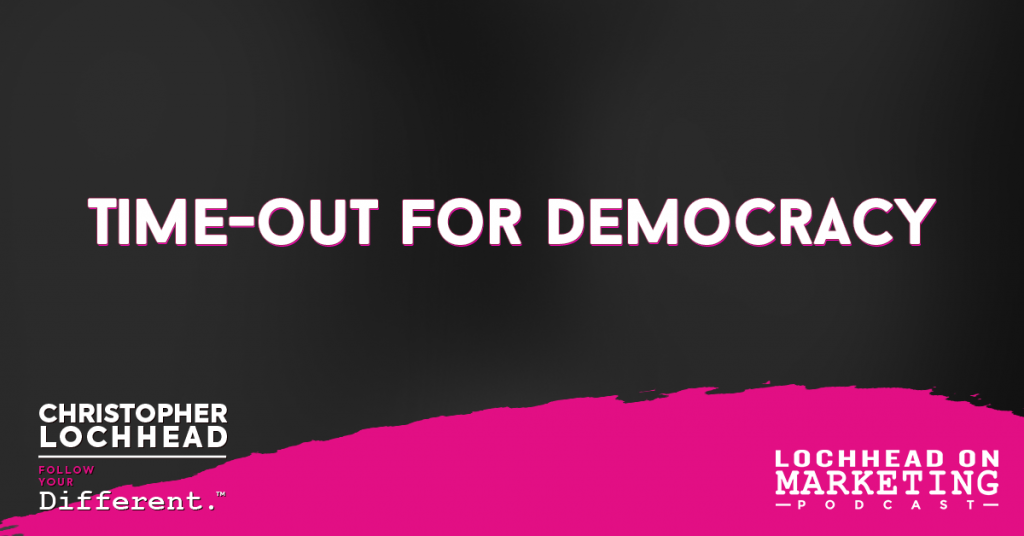
Podcast: Play in new window | Download (Duration: 4:39 — 3.2MB) | Embed
Subscribe: Apple Podcasts | Spotify | Pandora | RSS | More
This is Christopher. I wanted to let you know that we are going to take the pause that refreshes here as America votes. The entire attention of the United States is on the election as it should be. Much of the attention of Americans and the entire world is focused on this election.
We thought the wise thing to do would be to take some time off and come back after the election. The good news is if you love either of our podcasts, we have a tremendous back catalog. Unless you’ve listened to every Follow Your Different™ and every Lochhead on Marketing™ episode, there’s probably some gems in there you could really benefit from.
If you want a break from all of the political news over the next handful of days, there are some amazing conversations, legendary even that you might enjoy.
I want to ask you to vote
If you’re an American, I believe voting is a civic duty. I think it’s important to remember that. Democracy can’t happen without participation from its citizens. I think it’s important to remember that people have died for the right to vote. I think it’s important to remember that there are many human beings on planet earth who do not get that right, who do not live in a democracy where their voice matters.
I’m no political expert, but if you look at the polls and consume information, news and data, it looks like there’s a very good chance this could be a very close election.
I think the worst outcome we could have would be a rerun of 2000 Bush versus Gore or anything along those lines. I think what we absolutely need in the United States of America is a clear winner at the presidential level and a clear direction for Congress.
We need leaders, federally, who have a clear mandate to govern. I think a big part of the problem that we’ve had is things have been so close lately that many of us our confused by the messages.
We have a very divided country.
So please vote, make a plan to vote.
***
We’ll be back with new episodes of both Lochhead on Marketing™ and Follow Your Different™ shortly after the election here in the United States, bless you.
Please take care, stay legendary. And until we’re together again, follow your different.
078 Oceanspray’s Radically Generous Marketing TrendJack
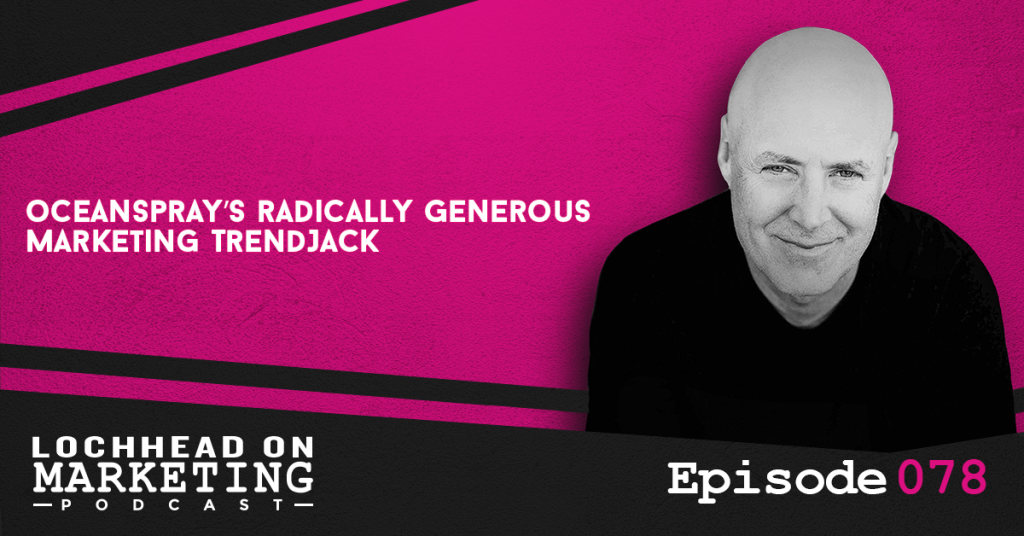
Podcast (lochheadonmarketing): Play in new window | Download (Duration: 12:26 — 8.5MB) | Embed
Subscribe: Apple Podcasts | Spotify | RSS | More
This is a super fun episode. Christopher Lochhead talks about what was almost for sure, the most fun marketing trendjack of 2020. On September 25th, Nathan Apodaca was going to work when his truck broke down. He grabbed his longboard skateboard and his bottle of Oceanspray and shot a video of himself going to work, drinking his juice while smiling and singing Fleetwood Mac’s classic song “Dreams.” The video went viral and Oceanspray and Fleetwood Mac just pulled off a feel-good trendjack of 2020.
Trendjacking In Past Episodes
If you’re a long time listener, you might remember Episode 23 with the legendary Paul Maher from Positive Marketing in the UK. He’s the godfather of trendjacking. In that episode, we popped the hood on this powerful marketing concept called the trendjack. Moreover, on Episode 26, we looked at how actor Ryan Reynolds and his gin company, Aviation trendjacked a Peloton ad. Ultimately, he sold it for $160 million.
“Part of what got Ryan there was being creative and doing things like trendjacks. A trendjack is a simple, powerful idea, where you look at what’s going on in the world of news and you find a creative way to put yourself in the middle of it.” – Christopher Lochhead
The Viral Video
Nathan Apodaca’s video has been viewed 61 million times on TikTok alone. His video started to go viral which led people to recreate his video while skateboarding or driving a bike or doing something with movement singing this song, including Mac Fleetwood and Stevie Nicks, herself and other celebrities, and normal, regular people.
“It created an absolute phenomenon on social media. Of course, the company Oceanspray was paying attention. Oceanspray CEO Tom Hayes got into the fun and he recorded his own version of Apodaca video. Now, as all of this was happening Fleetwood Mac’s 1977 classic ‘Dreams,’ as billboard says, thundered into the Top 10. Think about that for a second. Fleetwood Mac, 1977 with a top 10 hit, thanks to a viral video from Nate.” – Christopher Lochhead
Oceanspray’s Radical Generosity
Ocean spray decided to get radically generous and thoughtfully aggressive with this incredible opportunity. They proceeded to buy Nathan a new truck because his truck had broken down and they made sure they got him one that they called “Oceanspray Red.” Of course, they stuffed it with juice.
“Recently, CEO Hayes said ‘we have about 15 billion media impressions.’ You think that’s going to help sales. You think that’s going to help grow the category and the brand for ocean spray. Fascinatingly, Hayes has only been the CEO for about three months of Oceanspray. So for a brand new CEO to mobilize the company to take action on this, I think is pretty extraordinary.” – Christopher Lochhead
To know more about Christopher’s thoughts on this recent trendjacking of Oceanspray, download and listen to this episode.
Bio:
Christopher Lochhead is a #1 Apple podcaster and #1 Amazon bestselling co-author of books: Niche Down and Play Bigger.
He has been an advisor to over 50 venture-backed startups; a former three-time Silicon Valley public company CMO and an entrepreneur.
Furthermore, he has been called “one of the best minds in marketing” by The Marketing Journal, a “Human Exclamation Point” by Fast Company, a “quasar” by NBA legend Bill Walton and “off-putting to some” by The Economist.
In addition, he served as a chief marketing officer of software juggernaut Mercury Interactive. Hewlett-Packard acquired the company in 2006, for $4.5 billion.
He also co-founded the marketing consulting firm LOCHHEAD; was the founding CMO of Internet consulting firm Scient, and served as head of marketing at the CRM software firm Vantive.
We hope you enjoyed this episode of Lochhead on Marketing™! Christopher loves hearing from his listeners. Feel free to email him, connect on Facebook, Twitter, Instagram, and subscribe on Apple Podcast! You may also subscribe to his newsletter, The Difference, for some amazing content.
077 How Marketing Drives Market Cap / Company Valuation
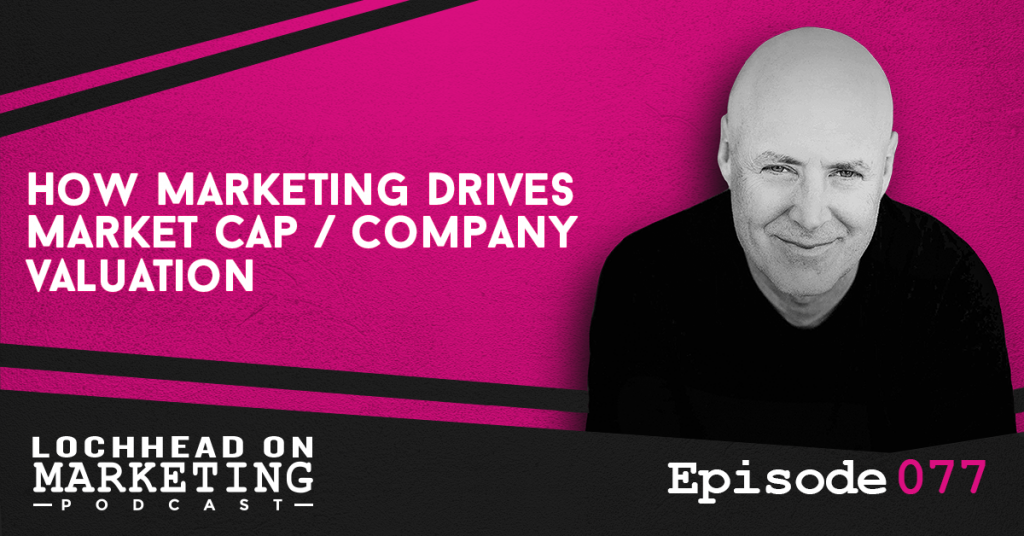
Podcast (lochheadonmarketing): Play in new window | Download (Duration: 11:46 — 8.1MB) | Embed
Subscribe: Apple Podcasts | Spotify | RSS | More
Every time a tech company launches a successful IPOs, we end up hearing a lot of negation from the media. Claims such as “I can’t believe this company is worth so much” or “so much money invested it must be crazy because they hardly have any revenue” or “they hardly have any profits or they rent.”
So in this episode, Christopher gives us a low-down on why market cap or valuation (the value of a company) is not only a function of financial metrics. He also talks about the crucial role marketing plays to actually help drive market cap.
What Really Drives The Value Of A Company
There are three principal drivers of a company’s value. The first is investors’ perception of the size and the growth rate of your market category. The second is the investor’s perception of the company’s ability to become the category queen. The third is the numbers and metrics in the context of the first two points that validate that this company is actually on a good path.
Breaking Down The Three
Christopher breaks down the characteristics of these three factors that drive the value of the company. He cites specific examples, such as Airbnb and how they were able to gain a successful IPO through these three factors.
“Marketing has to take a leading role here in helping the company articulate its category strategy. Why this category could be very big over time.” – Christopher Lochhead
What Does It Mean For You
Smart marketers, smart CEOs, smart founders, and certainly smart CFOs need to work together in the very early stages for your investor deck to cover these three factors. Christopher also discussed marketers and their major role in creating the perception of inevitability.
To know more about How Marketing Drives Market Cap / Company Valuation, download and listen to this episode.
Bio:
Christopher Lochhead is a #1 Apple podcaster and #1 Amazon bestselling co-author of books: Niche Down and Play Bigger.
He has been an advisor to over 50 venture-backed startups; a former three-time Silicon Valley public company CMO and an entrepreneur.
Furthermore, he has been called “one of the best minds in marketing” by The Marketing Journal, a “Human Exclamation Point” by Fast Company, a “quasar” by NBA legend Bill Walton and “off-putting to some” by The Economist.
In addition, he served as a chief marketing officer of software juggernaut Mercury Interactive. Hewlett-Packard acquired the company in 2006, for $4.5 billion.
He also co-founded the marketing consulting firm LOCHHEAD; was the founding CMO of Internet consulting firm Scient, and served as head of marketing at the CRM software firm Vantive.
We hope you enjoyed this episode of Lochhead on Marketing™! Christopher loves hearing from his listeners. Feel free to email him, connect on Facebook, Twitter, Instagram, and subscribe on iTunes! You may also subscribe to his newsletter, The Difference, for some amazing content.
076 Fighter or Farmer Chief Marketing Officer
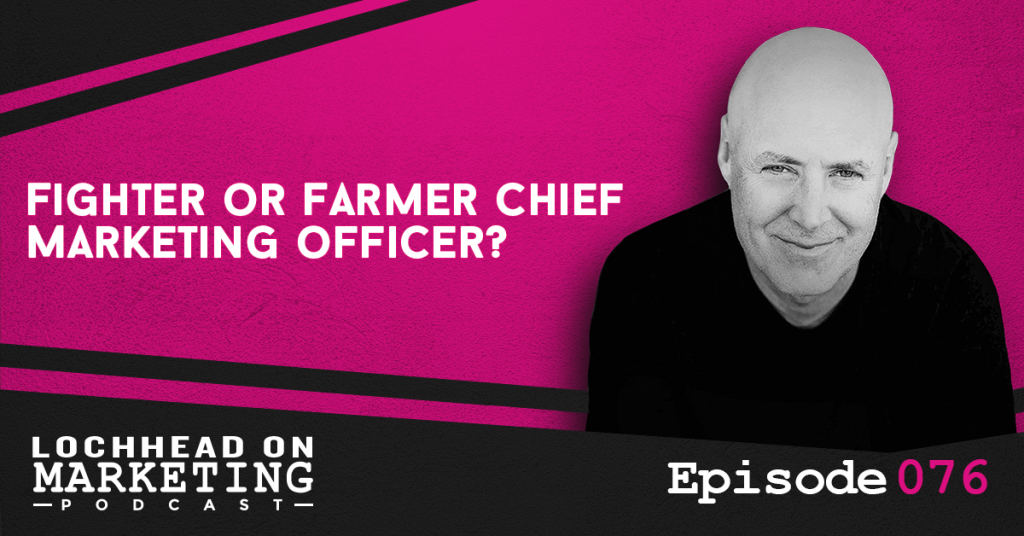
Podcast (lochheadonmarketing): Play in new window | Download (Duration: 10:52 — 7.5MB) | Embed
Subscribe: Apple Podcasts | Spotify | RSS | More
In today’s episode, Christopher Lochhead’s answer addresses a listener question, “what kind of CMO should we hire?” He further discusses what’s the difference between a fighter and a farmer CMO and what you, as a marketer, should keep in mind when you plan to pursue this role.
Get Clear On What You Want
Christopher discusses two things: first, identify the background of the CMO. This is highly specific based on the company and the current stage of the company and its category. Secondly, Christopher points out that it’s very important that the CMO knows who he is, his strengths and weaknesses, and his specific legendary trait.
“What am I legendary at? What am I not? How do I build a team based on that, that multiplies or amplifies where I’m strong and that compensates for my weaknesses?” – Christopher Lochhead
A Fighter Or A Farmer CMO
If you have identified where your company stands, that is the best indicator of whether you should hire a fighter or a farmer CMO. Chris gives a specific discussion on the difference between a fighter and a farmer CMO in this episode.
“What are the skill sets that you think are critical? That’s important, but it’s not maybe as important as a lot of people think. Second, are they self-actualized? Self-aware enough to know where they’re truly strong and truly weak? Do they have the capability to build a team around their strengths and weaknesses? And probably most importantly, are they a fighter, or a farmer?” – Christopher Lochhead
Advice For Marketers
Chris shares that if you’re a CMO yourself, it is critical for you to figure out how to be self-actualized. It is important to realize, are you more of a farmer? Or are you more of a fighter?
“As a marketer, I think you’d have to decide ‘who am I,’ and again, I don’t think there’s a right answer, but I think you should know. The worst thing you can do as a CMO, or a wannabe CMO is go take a farmer job in a place that requires a fighter or vice versa.” – Christopher Lochhead
To know more about what is a fighter or a farmer CMO, download and listen to this episode.
Bio:
Christopher Lochhead is a #1 Apple podcaster and #1 Amazon bestselling co-author of books: Niche Down and Play Bigger.
He has been an advisor to over 50 venture-backed startups; a former three-time Silicon Valley public company CMO and an entrepreneur.
Furthermore, he has been called “one of the best minds in marketing” by The Marketing Journal, a “Human Exclamation Point” by Fast Company, a “quasar” by NBA legend Bill Walton and “off-putting to some” by The Economist.
In addition, he served as a chief marketing officer of software juggernaut Mercury Interactive. Hewlett-Packard acquired the company in 2006, for $4.5 billion.
He also co-founded the marketing consulting firm LOCHHEAD; was the founding CMO of Internet consulting firm Scient, and served as head of marketing at the CRM software firm Vantive.
We hope you enjoyed this episode of Lochhead on Marketing™! Christopher loves hearing from his listeners. Feel free to email him, connect on Facebook, Twitter, Instagram, and subscribe on iTunes! You may also subscribe to his newsletter, The Difference, for some amazing content.
075 Movement Marketing w/ David Sacks
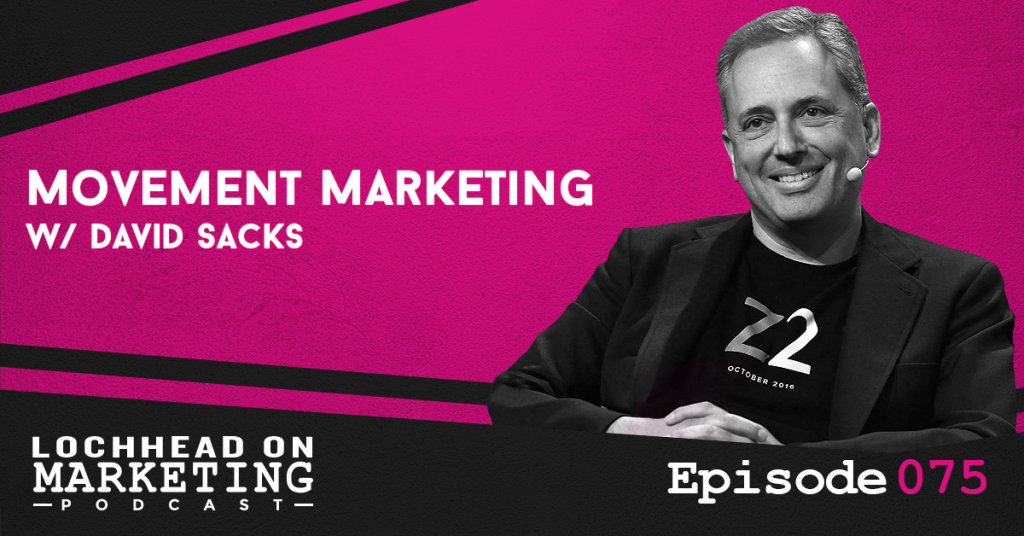
Podcast (lochheadonmarketing): Play in new window | Download (Duration: 1:26:49 — 59.6MB) | Embed
Subscribe: Apple Podcasts | Spotify | RSS | More
Today, we go deep on a big powerful idea called Movement Marketing with a legendary entrepreneur, category designer, and company builder turned venture capitalist, David Sacks, from Craft Ventures.
He’s written this blog post recently on this idea and it’s a simple, powerful idea that legendary innovators don’t just market a company or a product or a service, they create a movement that changes things. Frankly, it’s a seminal part of designing and dominating a new category. If you care about changing the future, this episode is pure gold with David.
Two Sections of Marketing
David likened marketing to LSAT, having math and verbal exams which ultimately give one final result. He says that marketing has a quantitative side, such as spending money on campaigns to generate x number of leads. It also has a qualitative side, which includes messaging, brand, content, press influencers, among others.
“Defining who you are to the world is one of the most important things that a founder can be doing. But the metrics are vague and elusive. So, therefore, because it’s hard to measure, I think a lot of founders don’t necessarily spend the time on it, they don’t really know how to approach it.” – David Sacks
Movement Marketing
David shares that the founders who built great companies have done more than just “create a company” or even a category. They have created a movement around their company. He wrote a blog post recently on this idea which went viral. He mentioned some great examples of CEO who have done movement marketing such as Elon Musk of Tesla and Marc Benioff of Salesforce.
“What I’ve tried to do is layout the tactics. This area of marketing is typically called earned marketing because you can’t just buy it, you have to earn it.” – David Sacks
Capturing Vs. Creating Demand
Christopher expounded on what David discuss the parts of marketing and how movement marketing is far from just quantitative and qualitative aspects of marketing. Movement marketing goes beyond capturing existing demand as it creates new demand.
“You’re creating a movement to drive a set of thinking around an idea, around a vision for the future, around a problem that hasn’t been addressed or viewed in the way that the founder views it. Or you see a possibility in the world, in the future.” – Christopher Lochhead
To know more about movement marketing, download and listen to this episode.
Bio:
David Sacks is a highly accomplished entrepreneur and investor in internet technology firms.
He is a general partner of Craft Ventures, a venture capital fund he co-founded in late 2017. Previously as an entrepreneur, Sacks was the founding COO and product leader of PayPal (acquired by eBay in 2002 for $1.5 billion) and Founder/CEO of Yammer (acquired by Microsoft in 2012 for $1.2 billion).
In 2016, he led the turnaround of Zenefits as interim CEO.
In 2017, Sacks co-founded blockchain startup Harbor as incubation of Craft Ventures.
His angel investments include Facebook, Uber, SpaceX, Palantir Technologies, Airbnb and Houzz.
Links:
We hope you enjoyed this episode of Lochhead on Marketing™! Christopher loves hearing from his listeners. Feel free to email him, connect on Facebook, Twitter, Instagram, and subscribe on Apple Podcast! You may also subscribe to his newsletter, The Difference, for some amazing content.
074 Marketing is Sales at Scale
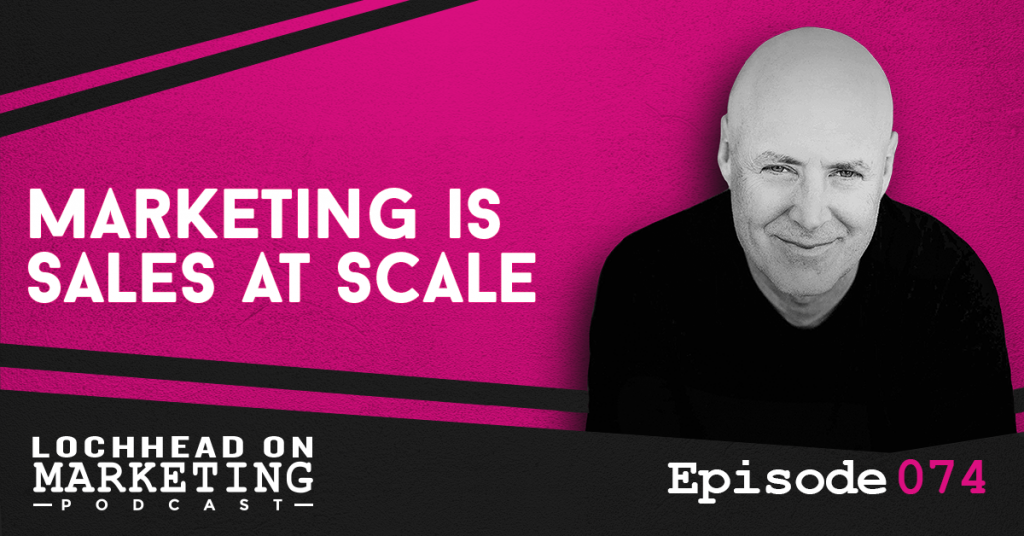
Podcast (lochheadonmarketing): Play in new window | Download (Duration: 7:16 — 5.0MB) | Embed
Subscribe: Apple Podcasts | Spotify | RSS | More
Welcome to Lochhead on Marketing. In this episode, Christopher Lochhead answers the question, what is the most important skill for marketers to have?
Sales Skills
Christopher shares that his frequent answer to the most important skill for marketers to have is sales skills. He says that a lot of marketing people have no sales experience at all.
“Marketing is actually sales at scale.” – Christopher Lochhead
The Best Marketers Are Salesmen
Christopher recounts that the best marketers he know are those who have sales experience even at a young age.
“I think legendary marketers, and frankly, legendary executives, for that matter, regardless of what part of the business you’re in, have a base level of a solid foundation of sales skills. So if you can’t sell one on one, then you can’t market at scale.” – Christopher Lochhead
Marketing People Are A Joke
Second prime importance why sales is the essential skill to have as a marketer, is that many salespeople think marketers are a joke.
“I know this is harsh, but it’s true. And the reason for that primarily, is that many people in the sales organization realize that many marketers suck in front of customers. And if you suck in front of one customer, how can you market to thousands or hundreds of thousands of potential customers.” – Christopher Lochhead
To know more why marketing is sales at scale, download and listen to this episode.
Bio:
Christopher Lochhead is a #1 Apple podcaster and #1 Amazon bestselling co-author of books: Niche Down and Play Bigger.
He has been an advisor to over 50 venture-backed startups; a former three-time Silicon Valley public company CMO and an entrepreneur.
Furthermore, he has been called “one of the best minds in marketing” by The Marketing Journal, a “Human Exclamation Point” by Fast Company, a “quasar” by NBA legend Bill Walton and “off-putting to some” by The Economist.
In addition, he served as a chief marketing officer of software juggernaut Mercury Interactive. Hewlett-Packard acquired the company in 2006, for $4.5 billion.
He also co-founded the marketing consulting firm LOCHHEAD; was the founding CMO of Internet consulting firm Scient, and served as head of marketing at the CRM software firm Vantive.
We hope you enjoyed this episode of Lochhead on Marketing™! Christopher loves hearing from his listeners. Feel free to email him, connect on Facebook, Twitter, Instagram, and subscribe on Apple Podcast! You may also subscribe to his newsletter, The Difference, for some amazing content.
073 Noble Purpose
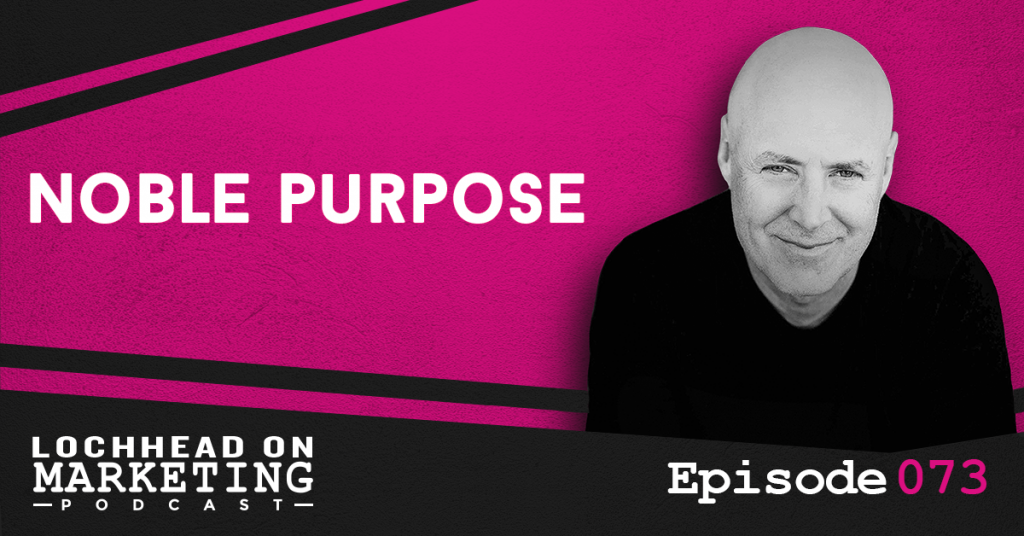
Podcast (lochheadonmarketing): Play in new window | Download (Duration: 11:46 — 8.1MB) | Embed
Subscribe: Apple Podcasts | Spotify | RSS | More
As this theme kept on coming up in Follow Your Different episodes, whether he spoke with entrepreneurs or venture capitalists, Christopher decided to finally talk about the purpose of business. Specifically, he dives into what his friend Gil Spencer calls a noble purpose and how noble purpose can tie to building categories companies brands.
Mission-Driven and Mercenaries
A noble purpose is a cool way of thinking about things that we do hear about in business and entrepreneurship. Sequoia Capital and many others, talks about it a lot. The discussion revolves around this notion of being mission-driven. Are you a mission-driven entrepreneur?
Similarly, Eddie Yoon, who has been a guest many times on my podcasts, shares about the distinction between missionaries and mercenaries.
“People who are on a mission will literally crawl through flaming glass — if that’s even a thing — to achieve their goal because they’re up to something, and no matter how much you pay a mercenary, when the going gets tough, many mercenaries will tap out.” – Christopher Lochhead
What Is Your Noble Purpose?
Chris shares a few more examples of companies and brands and how their noble purpose differentiated them and allowed them to dominate their categories. He spoke about TOM’s shoes. Another example he shares is about Patagonia, which is an environment-based company.
“Regardless of how you think about it, I think now’s a good time to think about what’s your noble purpose? Specifically, can you tie this notion of noble purpose mission-driven being a missionary to the design and development of your category and brand?” – Christopher Lochhead
Mission-Driven Entrepreneurs
Marc Benioff, CEO of Salesforce, is a proud supporter of LGBTQ+ rights movement. Vala Afshar of Salesforce shared about their noble missions in Follow Your Different Episode 116.
“Now’s a great time to think about what’s your noble purpose. Are we up to something greater than just making money and believe me, I’m a fan of making money. If you want to use this moment in time to clarify your noble purpose, why not think about how you can tie your noble purpose, to your category design, to your marketing, and maybe even to some level Have activism around topics that you think are important?” – Christopher Lochhead
To hear more about finding your noble purpose, download and listen to this episode.
Bio:
Christopher Lochhead is a #1 Apple podcaster and #1 Amazon bestselling co-author of books: Niche Down and Play Bigger.
He has been an advisor to over 50 venture-backed startups; a former three-time Silicon Valley public company CMO and an entrepreneur.
Furthermore, he has been called “one of the best minds in marketing” by The Marketing Journal, a “Human Exclamation Point” by Fast Company, a “quasar” by NBA legend Bill Walton and “off-putting to some” by The Economist.
In addition, he served as a chief marketing officer of software juggernaut Mercury Interactive. Hewlett-Packard acquired the company in 2006, for $4.5 billion.
He also co-founded the marketing consulting firm LOCHHEAD; was the founding CMO of Internet consulting firm Scient, and served as head of marketing at the CRM software firm Vantive.
Links:
116 Dreamforce Special w/ Salesforce’s Vala Afshar
024 The Difference Between a First Mover and a Category Creator w/ Eddie Yoon
We hope you enjoyed this episode of Lochhead on Marketing™! Christopher loves hearing from his listeners. Feel free to email him, connect on Facebook, Twitter, Instagram, and subscribe on Apple Podcast! You may also subscribe to his newsletter, The Difference, for some amazing content.
072 Designing Legendary Categories, Companies & Brands w/ Michelle Stacy
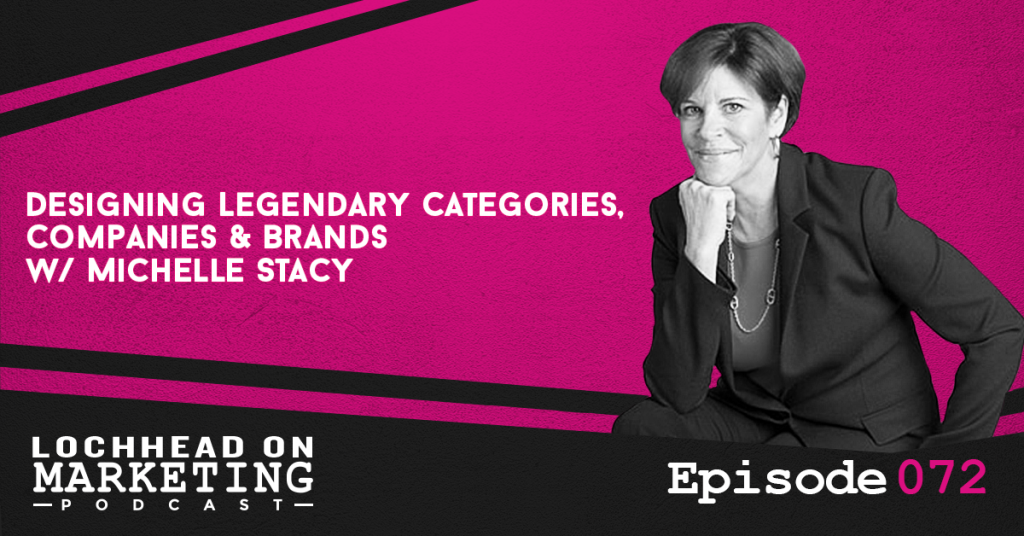
Podcast (lochheadonmarketing): Play in new window | Download (Duration: 52:15 — 35.9MB) | Embed
Subscribe: Apple Podcasts | Spotify | RSS | More
Today, Chris goes deep on how to design a legendary category, company product, and brand with his super special guest, Michelle Stacy. Michelle is a living consumer product marketing legend, honing her craft with brands such as Gilette, Oral B, Keurig, and now, HydraFacial.
Putting Consumers First
Michelle spent many years honing her craft at Gillette where she led Oral B. She launched a number of great new products including the Pulsar battery powered manual toothbrush. She was the President of Keurig from 2010 to 2014, where the business grew from less than $1 billion in revenue to 4.5 billion.
Through her leadership, she took Keurig from being a category-defining product to becoming — what we, in tech call — a platform. She did this when they started inviting in the competition to sell their coffee for Keurig machines. Additionally, she’s been a board member at iRobot, Coravin (a legendary wine preservation system), and Hydrafacial (Clint Carnell CEO on FYD #160)
“I think what always resonates with me is putting the consumer first and trying to think through ‘how do I make an emotional connection between what I want the consumer to buy and the product itself.’ To me, that’s where longevity happens around products. When you can get a consumer to fall in love with your product, then you have the opportunity, to as you would put it, become a Category King.” – Michelle Stacy
The Keurig Story
Michelle started working with Keurig in November 2008, more or less the onset of the global financial crisis. She found herself contemplating if she could ever push forward a premium-priced business given the financial crisis at that time. With consumers in mind and with the right launch plan, they successfully introduced a well-loved product.
“Keurig was actually the fifth single-serve company to market. They’re just the ones that got it right.” – Michelle Stacy
Creating Momentum
In this episode, Michelle walks us through the process of developing and launching Keurig machines. She mentions initially offering this to client-facing businesses, then slowly grew to every home through word of mouth. They also knew that customers do not like to be tied into a single brand of coffee, so they explored tying up with different coffee brands for their K-cups.
“In my DNA is the concept of looking at how you create value in every step of your environment so that you’re creating value for the consumer, you’re conveying value for the retailer, you’re creating value for your suppliers that are supplying you with the product. So as everyone benefits within an ecosystem, it creates momentum.” – Michelle Stacy
To know more about designing legendary categories and to know more about Michell Stacy, download and listen to this episode.
Bio:
Michelle is a strong leader whose personal and professional skills have developed over a 35-year career. Keurig, Gillette, and P&G have all benefited from her ability to develop and articulate a clear vision and strategy, build brands, and identify avenues for growth.
Michelle’s key to managing and driving exceptional growth has been her ability to create a positive and focused culture that generates high employee engagement, as well as talent for creating company-wide commitment to lead with a higher purpose.
A few of the brands that Michelle has impacted include:
The Gillette Series
Gillette Mach3
Oral-B
Oral-B Stages
Keurig
Links:
We hope you enjoyed this episode of Lochhead on Marketing™! Christopher loves hearing from his listeners. Feel free to email him, connect on Facebook, Twitter, Instagram, and subscribe on iTunes! You may also subscribe to his newsletter, The Difference, for some amazing content.
071 We Reserve The Right To Refuse Service
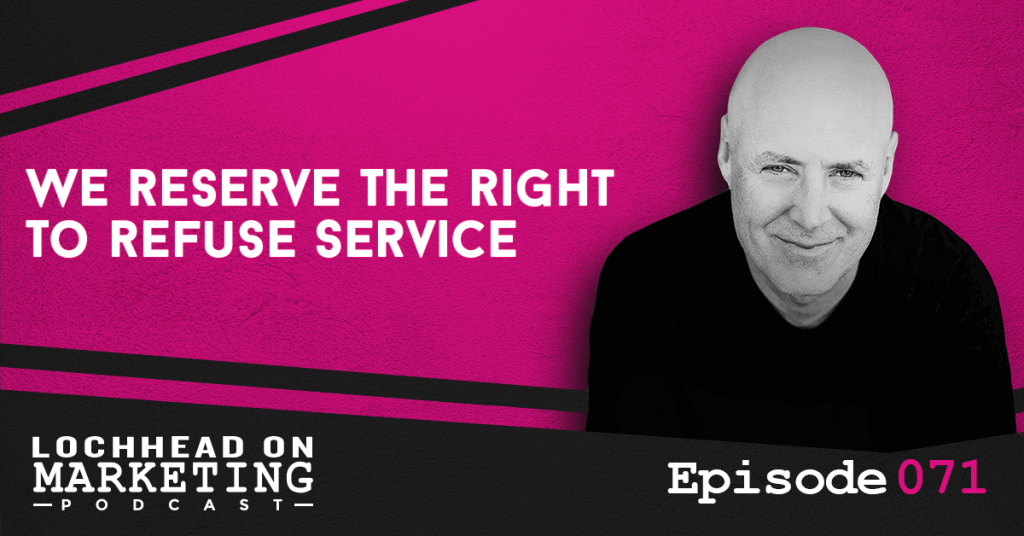
Podcast (lochheadonmarketing): Play in new window | Download (Duration: 18:33 — 12.7MB) | Embed
Subscribe: Apple Podcasts | Spotify | RSS | More
One listener writes: “This is such a confusing time and people are on edge. There’s a lot of arguing and mistrust in the US. It seems like we see more people acting out. In our case, we’ve had some customers behave really badly. When is it okay to turn a customer away?”
In this episode, Christopher shares his views on this matter about your right, as a business, to refuse service to customers.
What The Law Says
The law states that you are allowed to refuse anybody’s service, but you can’t do it on the basis of color, race, gender, sexual orientation, and other subjects along those lines. What Christopher advises is to seek legal advice and make sure to have consistent guidelines to enforce on your business, so your employees are well-guided.
“I think it’s okay to refuse service to Anybody who’s being a shithead and we had a situation happen here in the Santa Cruz Monterey Bay Area.” – Christopher Lochhead
Kicked Out Due To Bad Behavior
Christopher shares an incident that happened recently in a restaurant in Santa Cruz Monterey Bay Area called Bernardus Lodge where an Asian-American was spending their Fourth of July holiday. A Tech CEO, named Michael Lofthouse, who was also dining in, gave out racial slurs to the family.
The restaurant attendant, Gennica Cochran, immediately asked Michael to leave the premises to protect their customers.
“Number one, the folks at the who run the Bernardus Lodge have some core values and that in one way or another, whether it was formal or informal, they had communicated to their team, including, of course, Gennica Cochran and that there were certain behaviors they would tolerate. Racism, acting out and being an asshole clearly was something they were not going to allow. Gennica felt empowered to do that. I don’t know if she asked for permission. I don’t know what she did. But she took action.” – Christopher Lochhead
Please Wear A Mask
Christopher also shares some of his personal experience with enforcing wearing a mask. He is a strong supporter of this and he has received some backlash because of being vocal about it
“If you don’t like me, or you don’t want to listen to my podcast, because I’m trying to promote wearing masks in the United States, that’s okay. I think whatever the issue is, there comes a time in our lives as people and as business leaders, where we have to be clear about our core values and stand up for them.” – Christopher Lochhead
To hear more about having the right to refuse customers, download and listen to this episode.
Bio:
Christopher Lochhead is a #1 Apple podcaster and #1 Amazon bestselling co-author of books: Niche Down and Play Bigger.
He has been an advisor to over 50 venture-backed startups; a former three-time Silicon Valley public company CMO and an entrepreneur.
Furthermore, he has been called “one of the best minds in marketing” by The Marketing Journal, a “Human Exclamation Point” by Fast Company, a “quasar” by NBA legend Bill Walton and “off-putting to some” by The Economist.
In addition, he served as a chief marketing officer of software juggernaut Mercury Interactive. Hewlett-Packard acquired the company in 2006, for $4.5 billion.
He also co-founded the marketing consulting firm LOCHHEAD; was the founding CMO of Internet consulting firm Scient, and served as head of marketing at the CRM software firm Vantive.
Links:
The Right to Refuse Service: Can a Business Refuse Service to Someone?
San Francisco tech CEO kicked out of Carmel Valley restaurant following racist rant caught on camera
Ford CEO defends law enforcement use of Police Interceptor vehicle
We hope you enjoyed this episode of Lochhead on Marketing™! Christopher loves hearing from his listeners. Feel free to email him, connect on Facebook, Twitter, Instagram, and subscribe on iTunes! You may also subscribe to his newsletter, The Difference, for some amazing content.

